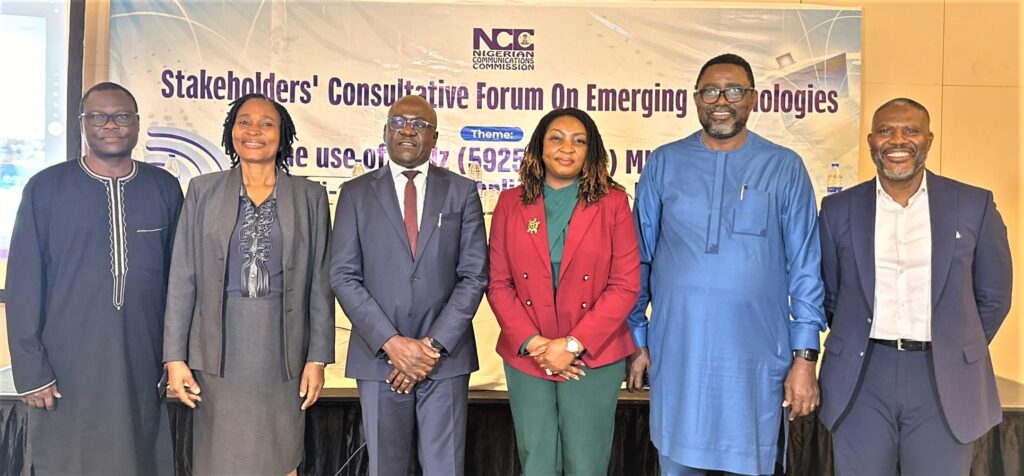
L-R: Executive Secretary, Association of Licensed Telecom Operators of Nigeria, Gbolahan Awonuga; Professor of Telecommunications Engineering, Federal University of Technology, Minna, Prof. Caroline Alenoghena; Executive Commissioner, Technical Services, Nigerian Communications Commission (NCC), Abraham Oshadami; Public Policy Manager, Anglophone West Africa, Meta, Sade Dada; Director, Compliance Monitoring and Enforcement, NCC, Efosa Idehen and President, Association of Telecom Companies of Nigeria, Tony Emoekpere, during a Stakeholders’ Consultative Forum on Emerging Technologies hosted by the Commission in Lagos on Thursday (September 19, 2024).
NCC seeks stakeholders’ input for 6GHz spectrum towards enhanced internet speed
The Nigerian Communications Commission (NCC) on Thursday said it is seeking stakeholders’ input towards the launch of 6GHz spectrum for improved internet speed in Nigeria.
The Executive Vice Chairman of the Commission, Dr. Aminu Maida, who was represented by the Executive Commissioner of Technical Services at NCC, Abraham Oshadami, spoke during a Stakeholders’ Consultative Forum on Emerging Technologies in Lagos.
According to him, the 6 GHz spectrum remains a band of radio frequencies that offers several benefits for wireless communication, including faster data rates and transmission speeds than previous bands.
The EVC said deploying this higher spectrum became necessary as the current 5GHz and 2.4GHz bands are facing capacity constraints.
Maida said the move would address the growing demand for high-speed internet and Nigeria would be joining the league of countries already utilizing part of the 6GHz band for Wi-Fi -6 applications.
He further explained that, “The 6GHz band, spanning from 5925 MHz to 7125 MHz, offers a substantial increase in available spectrum, which is crucial for supporting the growing demand for high-speed internet and advanced applications.
“Wi-Fi plays a crucial role in the distribution of fixed broadband connectivity in homes, offices, and various other environments.
“The vast majority of home internet traffic is connected to the end-user through Wi-Fi.
“In enterprise settings, Wi-Fi is essential for handling large amounts of data and simultaneously connecting large numbers of devices with improved reliability, higher data throughput and lower latencies.”
